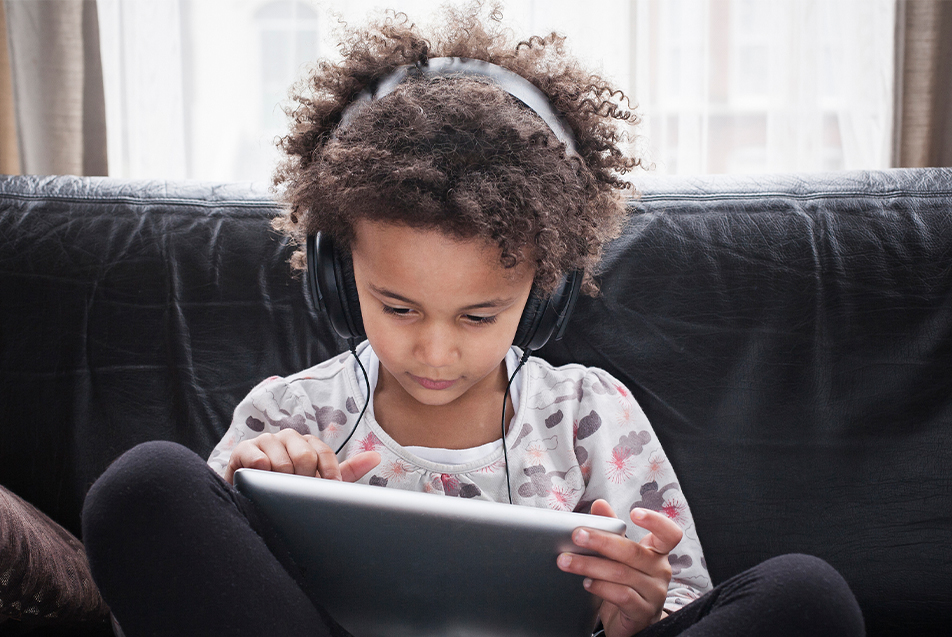
More than ever, electronic devices have become part of children’s lives during the pandemic. Parkview Health pediatrician Jose Nunez Alvarado, MD – who is also father to two young children – decided to look into the issue of screen time and its effect on child development since he gets questions from parents of the young patients he sees at Parkview Wabash. Here, he offers some thoughts on dos and don’ts when it comes to screen time.
During recent years, use of electronics and media has become an essential part of our lives. The correct use of electronic devices can be a powerful tool to promote learning and staying connected with the rest of the world, especially in times like this, when social distancing is the norm.
During this pandemic, children and adolescents are spending more time at home and have more access to electronic devices for school, homework, learning or entertainment. It is our duty as parents to ensure that electronics are used responsibly and understand that excessive use can have undesirable effects on our children’s health, behavior, development and even their safety.
Much research is being conducted on the topic of screen time and child development. The most studied effects of excessive use of electronics are:
Obesity: Excessive electronics use translates to less time being active and involved in physical activity. Children who watch a lot of television are also more likely to have unhealthy snacks and to overeat while watching TV. Heavy use during the early years is associated with weight gain and increase in BMI (body mass index) that puts the child at risk of developing obesity in later years.
Sleep: Constant exposure to electronics influences the sleep cycle of our children. Heavier exposure to electronics during the day and evening hours leads to less nighttime sleep. And when a television, computer, or other electronics are present in children’s rooms, this effect is increased.
Development: Studies show that the excessive use of television has a direct impact on our children’s development, causing delay in multiple areas (motor, language, cognitive and emotional skills). Some children also show problems with attention and social skills. This is because children who watch more television or use electronic devices more frequently have less direct interaction with their parents, other members of the household and other children. That interaction is so important because children learn about behavior by interacting with their peers and adults.
School-age children and adolescents also face other potentially very serious consequences related to inappropriate use of electronics and social media: Problems with school performance, risk-taking behavior (with exposure to alcohol, drugs, and sexual content), sexting, loss of privacy, exposure to predators and cyberbullying.
The American Academy of Pediatrics offers the following recommendations for the correct use of electronics:
Children under 18 months: Do not use electronics for children under 18 months, except for video calls.
Children 18 months to 2 years: Use of electronics should be limited. Children this age should only be exposed to high-quality content, and it is strongly recommended that an adult co-watch to explain and educate about what the child is watching.
Children 2 years and older: Media use should be limited to no more than one hour per day of high-quality content. For this age group, parents should co-watch the content and find other educational activities, like reading, to promote their children’s learning and development.
Parents should always select media that are educational, interactive and non-violent.
Other recommendations to parents:
- Create a plan and strict rules for the use of electronics at home.
- Always turn off electronics when they are not in use.
- Monitor the media that your children and adolescent are using.
- Avoid using electronics as the only way to calm or distract your children.
- Do not allow electronics in the children’s room.
- Any screen time should end at least one hour before bedtime.
- Playtime, reading time, meals and family time should be free of media and electronics.
- When watching TV together, avoid giving unhealthy snacks and control snack portions to prevent overeating. Encourage activities that require children to move and be more active when not using media.
Keep in mind that parents who spend a lot or time using electronics or social media also miss invaluable opportunities to spend time with their children during a crucial time in their development and to create meaningful connections. Parents and children who spend more time experiencing the world together – and not just passively consuming electronic media – develop better physical and emotional health, good lifelong habits and stronger relationships.



